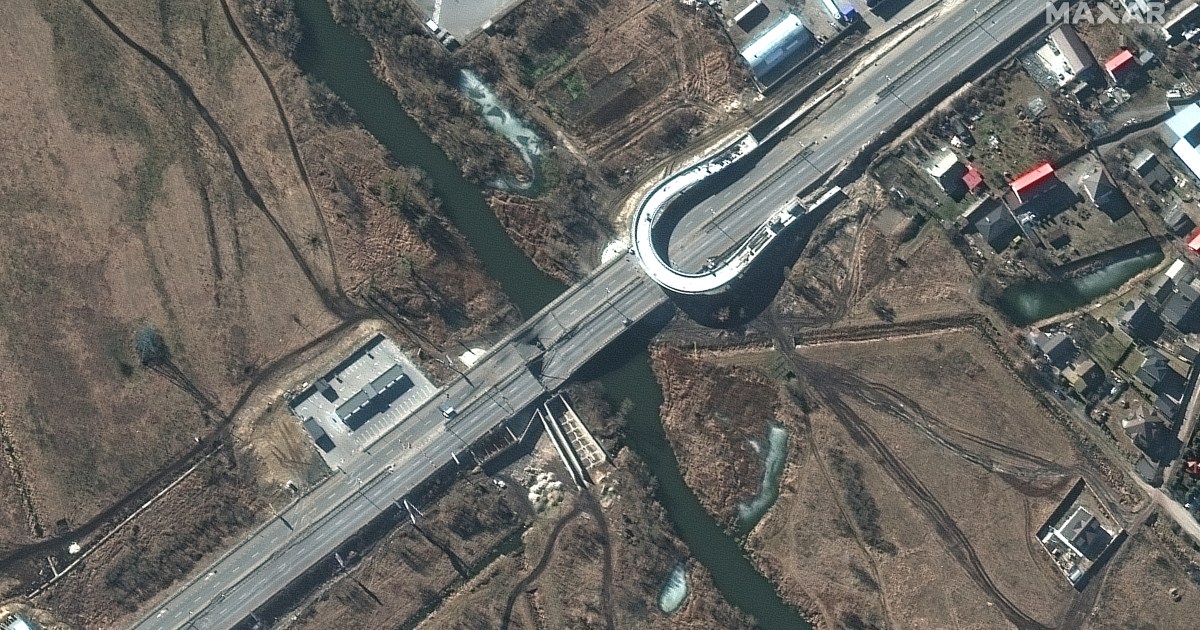Despite his apparent sadness, Soldier "Casper" of the Ukrainian volunteer units is ready to detonate bombs around the last bridge that still links Kyiv and its western suburbs, in light of the advance of Russian forces on the capital.
His comrades had previously blew up all other bridges on the western side of the Ukrainian capital, in a desperate attempt to stop the advance of Russian tanks.
The only bridge still standing over a river in the town of Belogorodka (25 kilometers west of the capital) leads to green villages with many summer residences, but it is now a war zone.
The city of Kyiv will be isolated from the surrounding areas to the west if "Casper" receives an order to blow up the bridge.
"We will do everything we can to keep him standing," the former paratrooper told AFP, but the approaching fighting is battering the morale of the Ukrainians on the barricades.
Russian warplanes joined ground forces in bombing nearby villages and towns.
The lines of refugees fleeing the approaching fighting seemed endless, and the few hours of quiet between strikes made Ukrainian soldiers fear that Russian forces were preparing for more violent attacks.
Watching a Ukrainian reconnaissance drone over the front line, Casper realizes he may soon have to destroy the last bridge still connecting Kyiv and its western suburbs.
"If we receive the order, or if we see the Russians advancing, we will blow it up with as many enemy tanks as possible," he added.
Prepare for street war
As the fighting reached the outskirts of Kyiv, the streets became increasingly dangerous and deserted by day, while Russian forces were now some 50 kilometers from the center of the capital after advancing on the eastern banks of the Dnieper.
But the western sector gives Russian forces direct access to the center of the capital and to the neighborhood that houses the seat of government.
With these fears, residents are preparing for street war, like mechanic Oleksandr Fedchenko, 38, who previously hosted in his spare time the filming of Ukraine's most popular car television program, but who turned his spacious garage into a secret weapons manufacturing center to equip Ukrainian volunteer units.
"When the war began, everything changed," Fedchenko says, before adding, "We discovered that our mechanics know how to make weapons, and others know how to make Molotov cocktails. We do everything we can."
May it be our last day
All employees of Fedchenko's auto repair shop replaced their oil-stained coats with olive-green uniforms of volunteer units.
Another mechanical volunteer, Kross, 28, maintains a heavy-caliber machine gun that Ukrainian soldiers have captured after seizing a Russian tank.
Cross tries to turn the submachine gun into a portable weapon that an untrained volunteer can use in street battles. "This thing might not aim well, but it's better than nothing," he says.
He adds, "How many people know that we are doing this, and it may not be legal, but with the war what is legal is no longer important, only our national defense matters to us."
"I felt helpless," Fedchenko explains, "I'm going to have a Kalashnikov in my arms, and I won't last 10 minutes, but I need to do something."
His improvised arms factory is now seriously vulnerable to a possible Russian strike, his spacious garage on a road at the western edge of Kyiv, and many of the industrial buildings on the same road now a shadow.
"Everyone here knows we can be attacked at any time," the mechanic continues. "Everyone knows this could be our last day, but they keep coming."
Tears also fall to retired Gana Galinchenko, 64, as she walks alone in the fields in the area separating the bridge guarded by "Casper" and the villages captured by Russian forces.
"I don't know where my sons are, I call them on the phone but no one answers," she says in a trembling voice.

